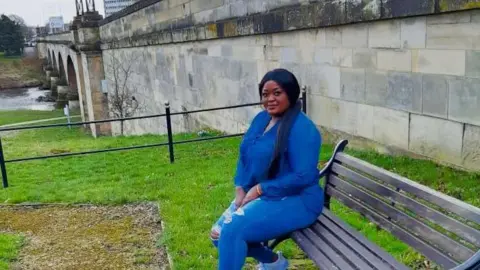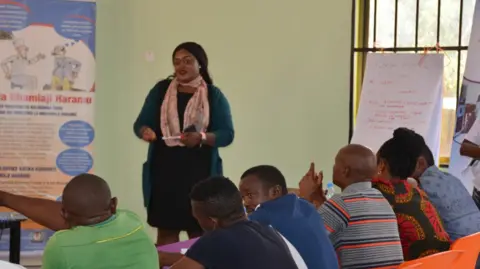'Life as an asylum seeker is not a bed of roses'
 Supplied
SuppliedA Kenyan woman who fled her home country because she says she was being persecuted over her sexuality is calling for a greater understanding of the difficulties faced by refugees.
Cynthia Waggah came to the UK in 2022 as she feared being arrested and having her child taken from her, having been outed in a country where homosexuality is illegal.
Ms Waggah, a former government official, is now happily settled in Carlisle but said initial doubts from some people about how genuine her need was had made her feel "unwanted".
She said seeking refuge was "not a bed of roses", but the UK had allowed her to create "a safe life" with her son.
Speaking to BBC Radio Cumbria as part of Refugee Week, which is running until Sunday, she explained the consequences of being outed by someone close to her were devastating.
Sentences for homosexuality in Kenya can range from fines to imprisonment, while in some cases people have been killed.
Travelling to the UK on a visitor's visa, she immediately sought asylum through the Home Office and spent several months living in hostel-style accommodation in Warrington before being given 24-hours' notice that she was being moved to Carlisle.
Recalling her old life, she said: "My life was beautiful. I had everything figured out career-wise, education-wise, family-wise. I was working at the Ministry of the Interior and I had my child.
"I had to take off because of persecution. Life became unbearable.
"The only way out was to seek refuge where human rights are upheld - a safe environment.
"It took a series of events for me to decide I had to leave."
'Swimming with sharks'
Her young son remained with family members in Kenya while Ms Waggah went through the application process.
In early 2024, she was notified she had been granted leave to remain in the UK for a period of five years and they are now reunited.
But the difficulty of being split up from her family was not the only obstacle she says she faced, as other asylum seekers viewed her sexuality negatively due to their cultural beliefs while some people in the UK were opposed to immigration.
 Supplied
Supplied"When I got here, I realised there's actually so much negativity around seeking refuge," she said.
"People think it's not genuine. That created stress. You feel really unwanted. It felt like being thrown in the ocean, swimming with sharks.
"We are coming here because you are part of the few enjoying human rights - something we see as a luxury where we come from.
"It's not a bed of roses. We are not coming to grab anything.
"I've been trying to integrate into the community and create a good life for me and the people around me."
Help came from various support organisations she contacted, including those helping members of the LGBTQ community.
As well as the shop she runs in Carlisle's Botchergate area, Ms Waggah chairs Cumberland Sanctuary Network, a group helping people seeking asylum and refuge.
While hoping to one day be able to return to Kenya, should their laws around homosexuality change, she is now settled in Cumbria.
"I pray for a day when human rights will be upheld [in Kenya], but I've created a safe life here and Carlisle is my home," she said.
